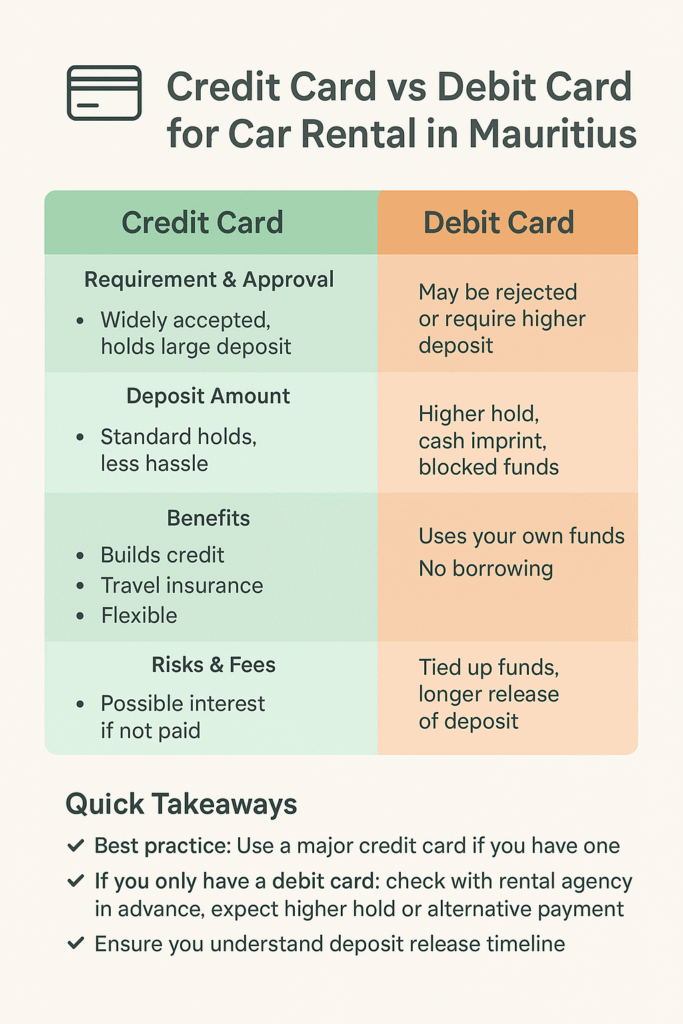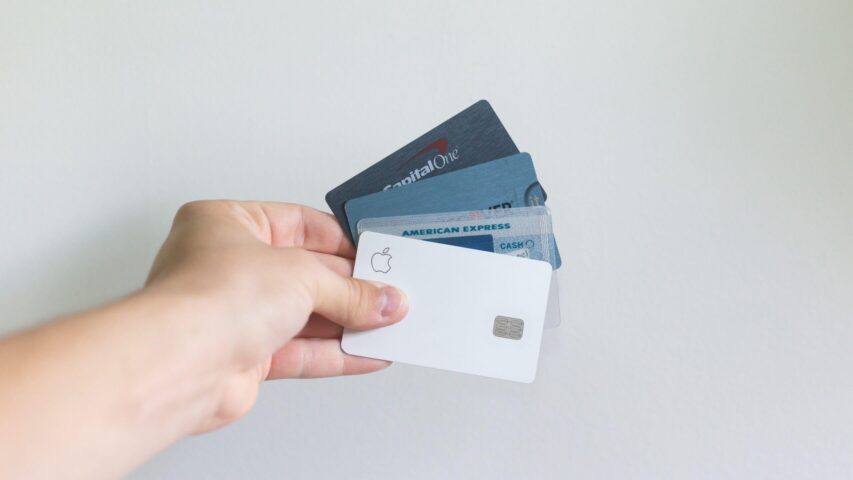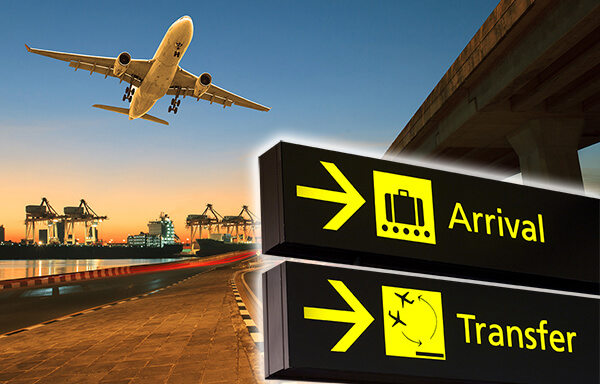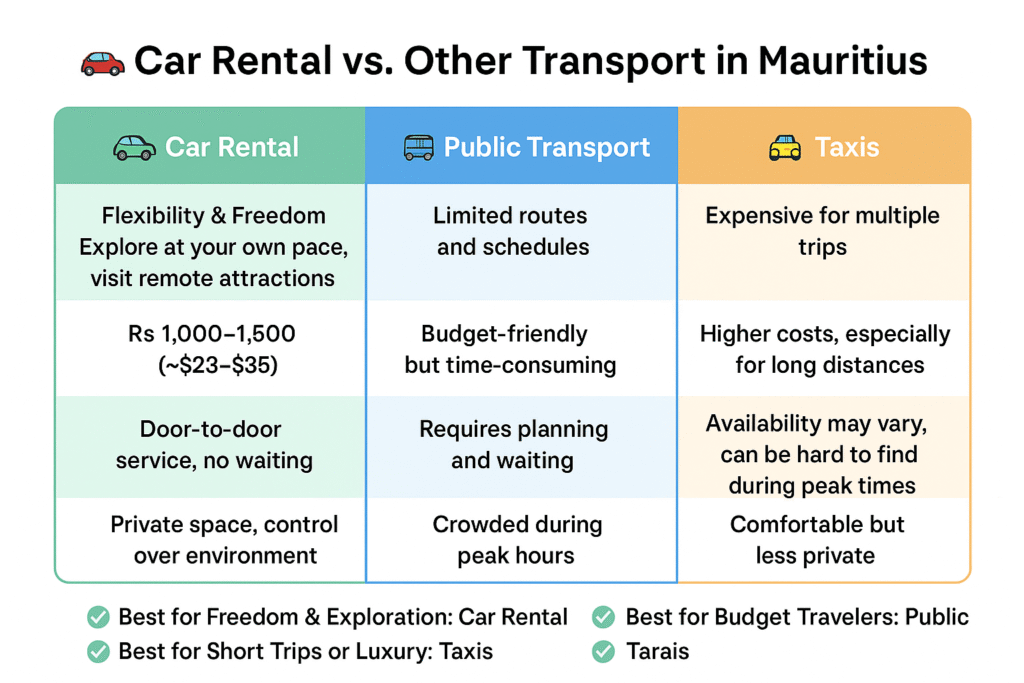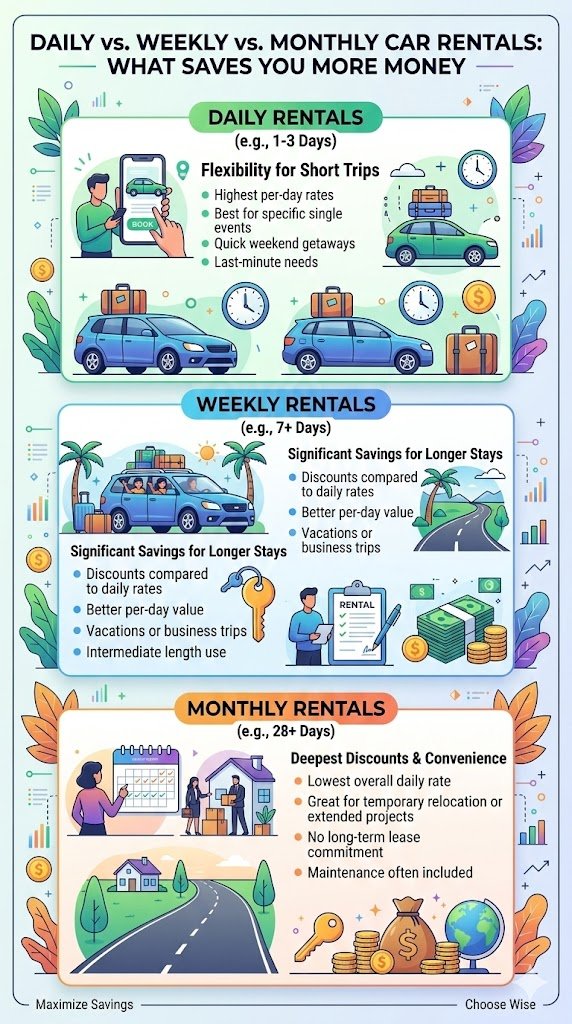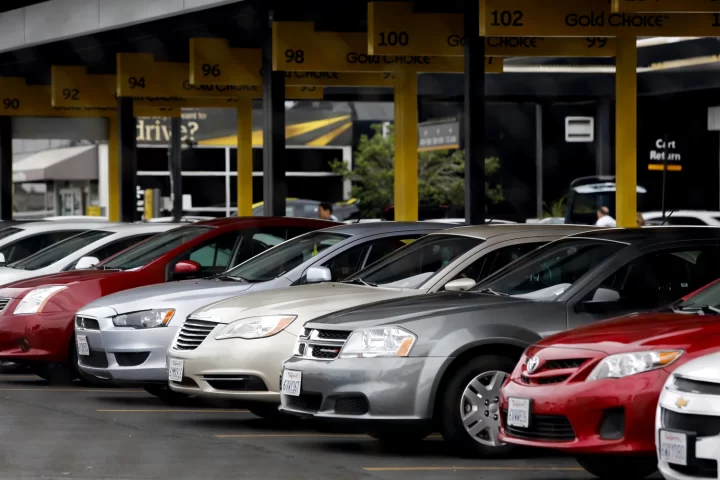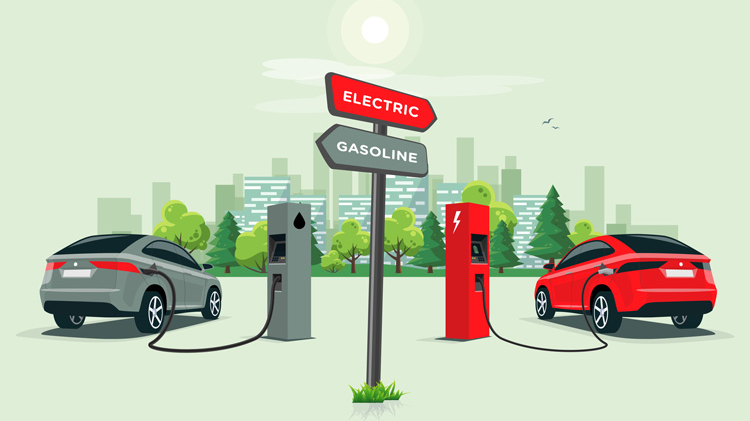Dreaming of turquoise waters, lush landscapes, and exotic cuisines but worried about the cost? I've been there. Mauritius, a gem in the Indian Ocean, often seems like a luxury destination out of reach for budget travelers. But I'm here to tell you, it's more accessible than you might think. With a bit of planning and some insider knowledge, visiting Mauritius without breaking the bank is entirely possible.
I've scoured the island, from the bustling markets of Port Louis to the serene beaches of Flic-en-Flac, to bring you the best tips and tricks for experiencing this paradise on a budget. Whether it's finding affordable accommodations, savoring local delicacies without the hefty price tag, or discovering free natural wonders, I've got you covered. Let's dive into how you can make your dream trip to Mauritius a reality, without compromising on the experience.
Understanding the Costs of Traveling to Mauritius
After exploring how Mauritius, despite its reputation as a luxury destination, can be surprisingly accessible for budget travelers, it's important to delve into the specifics of what makes this possible. Knowing the various costs involved in a trip to Mauritius allows for better planning and ensures that the experience remains unforgettable without breaking the bank. I'll break down the major cost categories, including accommodation, transportation, dining, and activities, offering insights into how to effectively manage your budget.
Accommodation Expenses
Finding affordable accommodations is key to visiting Mauritius on a budget. The island offers a range of options, from hostels and guesthouses to budget hotels and Airbnb rentals. Prices for these accommodations vary greatly depending on location, time of year, and amenities offered. On average, budget accommodations can range from $30 to $50 per night. To maximize savings, I recommend booking well in advance, preferring locations slightly off the beaten path, and considering stays with kitchen facilities to reduce dining costs. Also, leveraging online platforms for last-minute deals can sometimes result in significant discounts.
Transportation Costs
Transportation on the island comprises mainly of public buses, taxis, and car rentals. Public buses are the most economical choice, with fares typically under $2 for most routes, offering a great way to experience Mauritius like a local. Taxis, while more comfortable, can be pricey unless you negotiate the fare in advance. For those wanting more flexibility, renting a car can be a cost-effective option, especially for groups or families, with daily rental fees starting from around $30. I also suggest leveraging any free transportation offered by accommodations or exploring the possibility of bike rentals for shorter distances.
Food and Dining Budget
Mauritius is a haven for food lovers, with its mix of Creole, Indian, Chinese, and European influences. Local markets and street food vendors offer delicious meals at a fraction of the cost of dining in tourist-centric restaurants. An average meal at a local eatery might cost between $5 and $10, while street food options are even less, sometimes as low as $2-$3 for dishes like Dholl Puri or Biryani. If you're staying somewhere with cooking facilities, purchasing local produce and seafood from markets can not only save money but also provide a enriching cultural experience.
Activity and Excursion Prices
The good news is that many of Mauritius’s attractions, including its stunning beaches, hikes, and historical sites, are free to explore. However, for certain activities like snorkeling tours, boat excursions, or entrance to national parks, fees apply. Prices vary, but a typical half-day excursion can range from $20 to $50 per person. To save money, consider group offers, package deals, or booking directly with operators. Additionally, many accommodations provide complimentary activities, so check with your hotel or rental for any included experiences.
With strategic planning and an awareness of the costs involved, visiting Mauritius on a budget is entirely feasible. By prioritizing your spending, seeking out local experiences, and making educated choices based on detailed cost insights, you can enjoy all the beauty and culture Mauritius has to offer without overspending.
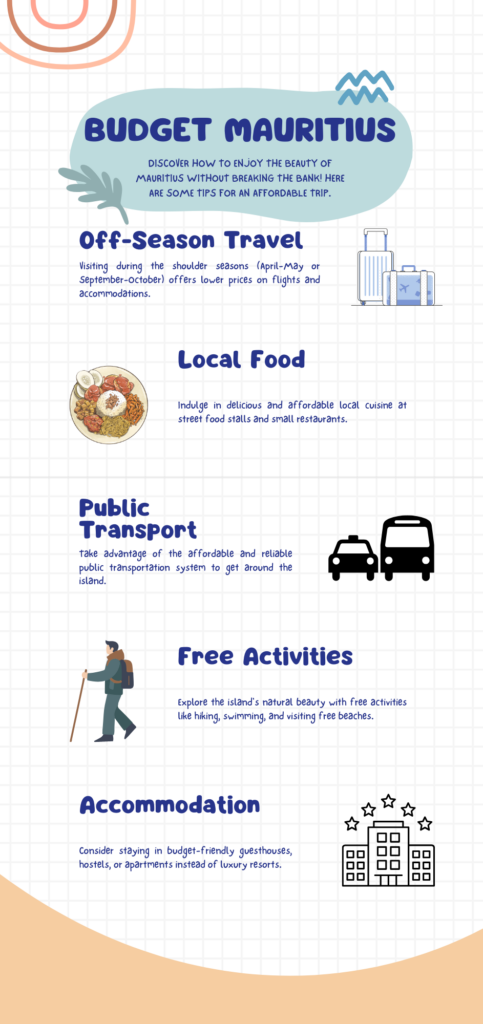
Best Time to Visit Mauritius on a Budget
Continuing from my exploration of making Mauritius accessible for budget travelers, finding the right time to visit this island paradise can significantly cut costs. This section delves into the best period to travel to Mauritius without breaking the bank, focusing on off-peak season benefits and weather considerations.
Also read: Useful things to know before you Travel To Mauritius
Off-Peak Season Advantages
Traveling to Mauritius during the off-peak season, primarily between May and September, offers numerous benefits for budget-conscious tourists. Firstly, airfare and accommodation prices tend to drop during these months, making it more affordable to secure flights and places to stay. I've noticed that budget accommodations, which are already competitively priced, become even more economical.
Moreover, exploring Mauritius in the off-peak season means fewer crowds at popular tourist spots. This not only enhances the visitor experience, allowing for a more relaxed exploration of attractions but also increases the likelihood of finding deals and discounts on activities. Many tour operators and attractions offer reduced prices to encourage tourism during these quieter months.
Lastly, the off-peak season is ideal for travelers who prioritize experiencing local life. With fewer tourists around, it's easier to interact with locals, who are usually more available to share insights into their culture and traditions. This immersive experience can be invaluable and comes without the hefty price tag often associated with peak travel times.
Weather Considerations in Mauritius
Understanding Mauritius' weather patterns is crucial for planning a budget-friendly trip. The off-peak season coincides with the Mauritian winter, which, unlike the winter in many other parts of the world, is mild and pleasant. Temperatures during these months average between 17°C and 24°C, making it comfortable for exploring outdoor attractions without the intense heat of the summer months.
However, it's important to note that this period can also see more rainfall, particularly in the central and eastern parts of the island. Packing a lightweight rain jacket and planning indoor activities for rainy days can help ensure that the weather doesn't disrupt your travel plans.
Balancing the advantages of lower costs and fewer tourists with the potential for rain, I've found that visiting Mauritius from May to September strikes the perfect balance for budget travelers. This period allows for enjoying the island's stunning landscapes and vibrant culture without the crowds and high prices of the peak season, provided you're prepared for the occasional shower.
Optimizing the timing of your visit to Mauritius by selecting the off-peak season can enhance your experience while ensuring the trip remains affordable. Remember, the key to a successful budget-friendly holiday lies in strategic planning, including when to visit. By considering both the financial and weather-related aspects, you can make the most of your Mauritian adventure without overspending.
Budget-Friendly Accommodation Options
Visiting Mauritius doesn't have to break the bank, especially when it comes to finding a place to stay. I've discovered some budget-friendly accommodation options that ensure a comfortable stay without stretching your wallet too thin.
Guesthouses and B&Bs
Guesthouses and Bed & Breakfasts (B&Bs) in Mauritius offer a cozy, intimate experience at a fraction of the cost of luxury resorts. I find that these accommodations often include breakfast, providing a great start to your day without the added expense. Many guesthouses and B&Bs are family-run, which means you'll receive personalized attention and invaluable local insights. Locations vary from beachfront to city-center, allowing you to choose based on your interests. By staying in a guesthouse or B&B, I've not only saved money but also immersed myself in the local culture, making my visit to Mauritius more memorable.
Hostels and Dormitories
For solo travelers and backpackers, hostels and dormitories represent the ultimate budget-friendly accommodation in Mauritius. These options allow you to save on lodging so you can allocate more funds toward experiences and activities. Hostels in Mauritius often feature communal kitchens, which means you can prepare your meals and save even more. Additionally, the communal lounges and shared spaces offer fantastic opportunities to meet fellow travelers. From my experience, hostels and dormitories are not just about saving money; they're about building a community. Whether you're in the north near Grand Baie or in the capital, Port Louis, you'll find a hostel that fits your budget and your vibe.
Vacation Rentals
Vacation rentals, such as apartments or villas, present a cost-effective solution for families or groups traveling to Mauritius. Splitting the cost among several people makes these rentals incredibly affordable. Moreover, having your own kitchen can significantly reduce dining expenses since you can cook meals instead of eating out. I've found that vacation rentals offer a level of privacy and comfort that's hard to match, along with the freedom to live like a local. Platforms like Airbnb or Vrbo host a range of listings across Mauritius, from beachside cottages to urban apartments, ensuring that you'll find something within your budget.
By exploring these accommodation options, I've managed to visit Mauritius without overspending. Guesthouses and B&Bs, hostels and dormitories, and vacation rentals each offer unique benefits that cater to different types of travelers, all while keeping costs low. Remember, a trip to Mauritius on a budget doesn't mean compromising on experience; it's about making smart choices that enhance your journey.
Saving on Transportation
In Mauritius, transportation can quickly add up if you're not careful. Thankfully, there are numerous ways to save on transportation without sacrificing the convenience or the joy of exploring everything the island has to offer. Here, I'll dive into some smart choices that can help keep your budget in check.
Public Transport Over Tourist Shuttles
Opting for public transport over tourist shuttles is a cost-effective way to get around Mauritius. Buses in Mauritius are reliable and cover most tourist destinations. They offer an authentic experience of day-to-day life on the island. Fares are significantly lower than what you'd pay for tourist shuttles or private taxis. Moreover, riding the bus provides an opportunity to meet locals and get recommendations that aren't in the travel guides. Just make sure to check the schedules as some routes may have limited services, especially in the evening or on weekends.
Car Rental Tips
Renting a car is a great option for those who value flexibility in their travel plans. To save money, I recommend booking your rental car in advance, as prices tend to be higher if you book upon arrival. Comparing rates from different rental agencies can also lead to significant savings. Look out for rental packages that include insurance, as this can often be an unexpected addition to your budget. Consider fuel efficiency when choosing your car; Mauritius has plenty to explore, and a fuel-efficient vehicle can be kinder to your wallet in the long run.
Walking and Biking Routes
Mauritius is not just about the beaches; it's a place where you can walk or bike through lush landscapes and charming towns. Exploring on foot or by bike is not only free but also allows for a more intimate experience with nature and the culture of this beautiful island. Coastal towns, botanical gardens, and the Mauritian countryside offer safe and scenic routes for bikers and hikers alike. Places like Grande Rivière Noire and Tamarin are perfect for cycling, while the vibrant streets of Port Louis offer an array of sights within walking distance. Always stay hydrated and wear appropriate gear when exploring under the sun.
By following these tips, I've managed to explore Mauritius extensively without straining my budget. With a bit of planning and smart choices, you too can discover the wonders of this island in a cost-effective manner.
Affordable Dining and Local Eats
Embarking on a journey to explore Mauritius doesn't mean you have to spend a fortune to enjoy delicious meals. With a focus on affordable dining and local eats, I'm excited to share some insider tips that will help you savor the flavors of the island without breaking the bank.
Street Food and Markets
Diving into the bustling street food scene is a must for budget-conscious travelers. Mauritius boasts a variety of street food stalls and markets where you can sample local delicacies at a fraction of restaurant prices. Key spots like the Port Louis Central Market offer a range of mouthwatering options, from the famous "dholl puri" to "rotis", providing an authentic taste of Mauritian cuisine for just a few rupees. These dishes not only promise a culinary adventure but also offer the added experience of mingling with locals and soaking in the vibrant atmosphere of Mauritian markets.
Local Restaurants Over Tourist Traps
Opting for local restaurants over tourist traps is another effective way to enjoy affordable yet delicious meals. I've found that eating where the locals eat not only guarantees lower prices but also a more authentic culinary experience. Many local spots serve generous portions of Creole dishes, seafood, and other specialties at a fraction of the cost you'd find in restaurants geared towards tourists. To discover these gems, I recommend asking locals for their recommendations or simply wandering off the beaten path. You'll be surprised at the quality and affordability of meals you can enjoy, allowing you to delve deeper into the island's culture through its cuisine.
Self-Catering to Save Money
For those staying in accommodations with kitchen facilities, self-catering is an excellent way to manage food expenses. Shopping at local supermarkets or open-air markets like the Flacq Market gives you access to fresh produce, meats, and seafood at local prices. Preparing your meals not only saves money but also allows you to experiment with Mauritian recipes, creating a more personalized dining experience. Whether it's a simple breakfast with fresh tropical fruits or a full-fledged dinner featuring local spices and ingredients, self-catering can significantly reduce your dining costs while adding an enriching aspect to your travel experience.
By embracing street food and markets, preferring local restaurants, and considering self-catering options, you can enjoy the culinary delights of Mauritius without straining your budget. These strategies not only ensure a more affordable trip but also foster a deeper connection with the island's culture and local way of life.
Free and Low-Cost Attractions
Moving from savoring Mauritius' local delicacies and embracing the vibrant street food culture to exploring the island's natural beauty and cultural heritage, there are numerous free and low-cost attractions that promise an enriching experience without straining your wallet. I'll guide you through some of the must-visit places where you can soak in the unparalleled beauty of Mauritius, learn about its rich history, and engage in thrilling outdoor activities, all while adhering to a budget.
Beaches and Natural Sights
Mauritius is synonymous with stunning beaches and breathtaking natural sights, many of which are accessible without any entrance fee. One cannot talk about Mauritius without mentioning the pristine beaches such as Flic en Flac, Pereybere, and Mont Choisy. These beaches offer clear, turquoise waters and soft, sandy shores perfect for relaxation, swimming, and snorkeling. Beyond the beaches, the island's natural reserves, like the Black River Gorges National Park, provide free access to scenic viewpoints, waterfalls, and diverse flora and fauna. The park's abundant hiking trails cater to all fitness levels, leading visitors through lush greenery and offering the chance to spot rare birds and plants.
Museums and Cultural Sites
For those intrigued by Mauritius' multifaceted history and culture, several museums and cultural sites offer free or low admission fees. The Blue Penny Museum, located in the capital city of Port Louis, houses rare Mauritian stamps and provides insights into the island's colonial history and cultural diversity for a nominal fee. Another gem is the SSR Botanical Garden in Pamplemousses, one of the oldest botanical gardens in the Southern Hemisphere, where visitors can marvel at giant water lilies and a variety of endemic plants for a small entry charge. These sites not only offer a peek into the island's past but also showcase its commitment to preserving natural beauty and cultural heritage.
Outdoor Activities and Hikes
Mauritius is a paradise for nature enthusiasts and adventure seekers, offering a plethora of outdoor activities and hikes that require minimal to no expenses. The island's rugged terrain and natural landscapes provide the perfect backdrop for hiking and trekking. Trails like the Le Morne Brabant, a UNESCO World Heritage site, offer breathtaking views of the island and the ocean, making the challenging hike worth every step. Similarly, the Tamarin Falls or Seven Cascades, a series of waterfalls in southwest Mauritius, can be explored independently or with a guide for a small fee, providing the opportunity to swim in natural pools and enjoy the serene environment.
By visiting these beaches, museums, cultural sites, and engaging in outdoor activities and hikes, I've discovered that experiencing the best of Mauritius doesn't have to break the bank. These attractions highlight the island's natural wonders, rich history, and vibrant culture, offering budget-conscious travelers an array of options to explore without compromising their experience.
Practical Tips to Keep Expenses Low
Given my experiences and research, navigating Mauritius without blowing your budget is entirely feasible with smart planning and insider tips. From daily budgeting to avoiding unnecessary expenses, I'll unpack proven tactics that ensure a memorable yet affordable Mauritius adventure.
Daily Budget Planning
Sticking to a daily budget is paramount when exploring Mauritius on a budget. Begin by defining how much you're willing to spend each day. This amount should include accommodations, meals, transportation, and a small buffer for miscellaneous expenses. Accommodations and dining at local spots often consume the largest portion of a traveler's budget, but by leveraging tips from earlier sections, such as opting for guesthouses or self-catering units and savoring street food, significant savings can be achieved. When it comes to transportation, consider using public buses or renting a bicycle to navigate the island. Not only are these options cost-effective, but they also offer a deeper immersion into the local lifestyle. Allocating a specific amount daily for activities or attractions ensures you don't miss out on Mauritius's gems while keeping expenses in check. Remember, many of the island’s natural attractions come at no cost.
Avoiding Tourist Traps and Scams
Mauritius, while predominantly safe and welcoming, has its share of tourist traps and scams, just like any popular destination. To keep expenses low, familiarize yourself with common practices designed to overcharge or deceive tourists. For instance, be cautious of unsolicited guides or vendors, especially near popular tourist spots who may charge inflated prices. Research activities and market prices before your trip to have a sense of what you should be paying. Similarly, when booking tours or experiences, do it through reputable agencies or your accommodation to avoid being overcharged. Experiencing the island like a local not only provides an authentic flavor of Mauritius but often leads to encountering fewer tourist traps.
Using Local Currency and Bargaining
In Mauritius, dealing in the local currency (Mauritian Rupee, MUR) tends to be more cost-effective than using foreign currencies or making card payments, which might involve additional fees. Withdraw local currency at ATMs or exchange money at authorized dealers for the best rates. Bargaining is a culture in many local markets and shopping areas, so don't hesitate to negotiate prices, especially for souvenirs or services like taxis, which don't have fixed rates. However, it's crucial to bargain respectfully and recognize when a price is fair, both to ensure savings and to contribute positively to the local economy.
By following these practical tips to keep expenses low, your visit to Mauritius can be both enriching and economical. Engaging with the island’s lifestyle, prioritizing experiences over expenses, and making informed decisions based on the island's norms enable a budget-friendly journey without compromising the essence of Mauritius.
Conclusion
Visiting Mauritius doesn't have to break the bank. With the right strategies in place, I've shown you how to enjoy the island's breathtaking beauty and rich culture without overspending. Remember, the key to a budget-friendly trip lies in smart planning and local immersion. By choosing affordable accommodations, indulging in local cuisine, and embracing free attractions, you're not just saving money; you're experiencing Mauritius like a true local. Staying vigilant against tourist traps and making informed choices about where and how to spend your money will ensure your trip is both memorable and affordable. So pack your bags and get ready to explore Mauritius in a way that's kind to your wallet and enriching for your soul.


